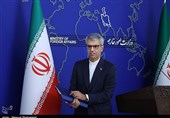Putin Rebuffs Obama as Ukraine Crisis Escalates
TEHRAN (Tasnim) - Russian President Vladimir Putin rebuffed a warning from US President Barack Obama over Moscow's military intervention in Crimea, saying on Friday that Russia could not ignore calls for help from Russian speakers in Ukraine.
After an hour-long telephone call, Putin said in a statement that Moscow and Washington were still far apart on the situation in the former Soviet republic, where he said the new authorities had taken "absolutely illegitimate decisions" on the eastern, southeastern and Crimea regions.
"Russia cannot ignore calls for help and it acts accordingly, in full compliance with international law," Putin said.
Ukraine's border guards said Moscow had poured troops into the southern peninsula where Russian forces have seized control.
Serhiy Astakhov, an aide to the border guards' commander, said there were now 30,000 Russian soldiers in Crimea, compared to 11,000 permanently based with the Russian Black Sea fleet in the port of Sevastopol before the crisis.
Putin denies that the forces with no national insignia that are surrounding Ukrainian troops in their bases are under Moscow's command, although their vehicles have Russian military plates. The West has ridiculed this claim, Reuters reported.
The most serious east-west confrontation since the end of the Cold War - resulting from the overthrow last month of President Viktor Yanukovich after violent protests in Kiev - escalated on Thursday when Crimea's parliament, dominated by ethnic Russians, voted to join Russia. The region's government set a referendum for March 16 - in just nine days' time.
European Union leaders and Obama denounced the referendum as illegitimate, saying it would violate Ukraine's constitution.
The head of Russia's upper house of parliament said after meeting visiting Crimean lawmakers on Friday that Crimea had a right to self-determination, and ruled out any risk of war between "the two brotherly nations".
Before calling Putin, Obama announced the first sanctions against Russia since the start of the crisis, ordering visa bans and asset freezes against so far unidentified persons deemed responsible for threatening Ukraine's sovereignty.
Japan endorsed the Western position that the actions of Russia, whose forces have seized control of the Crimean peninsula, constitute "a threat to international peace and security", after Obama spoke to Prime Minister Shinzo Abe.
China, often a Russian ally in blocking Western moves in the UN Security Council, was more cautious, saying that economic sanctions were not the best way to solve the crisis and avoiding comment on the legality of a Crimean referendum on secession.
The EU, Russia's biggest economic partner and energy customer, adopted a three-stage plan to try to force a negotiated solution but stopped short of immediate sanctions.
The Russian Foreign Ministry responded angrily on Friday, calling the EU decision to freeze talks on visa-free travel "extremely unconstructive" and warning that Moscow would retaliate against any sanctions.
Brussels and Washington also rushed to strengthen the new authorities in economically shattered Ukraine, announcing both political and financial assistance.
Promises of billions of dollars in Western aid for the Kiev government, and the perception that Russian troops are not likely to go beyond Crimea into other parts of Ukraine, have helped reverse a rout in the local hryvnia currency.
In the past two days it has traded above 9.0 to the dollar for the first time since the Crimea crisis began last week. Local dealers said emergency currency restrictions imposed last week were also supporting the hryvnia.





